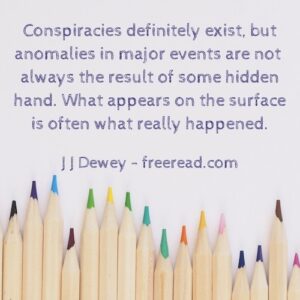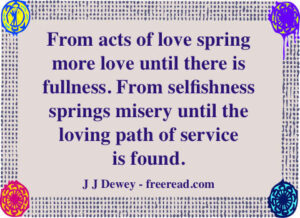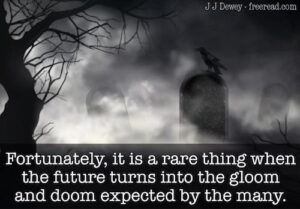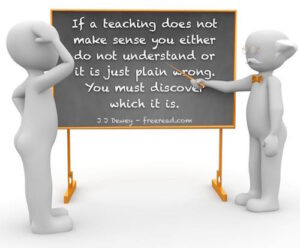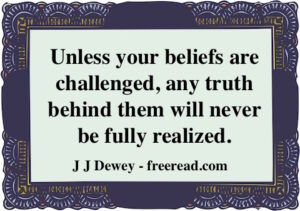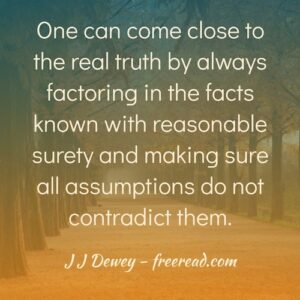
Discovering Truth
Back in 2006 I posted a 17-part series on what I called “The Principles pf Discovery.” This involved a series of principles that all can use to discover as much truth as possible without involving supernatural powers. And then, even those who claim truth by revelation from God, an angel or master are often misled themselves, and should only be accepted if they are confirmed by evidence without and confirmation within one’s own soul.
I consider these principles important because even the most enlightened do not discern every situation or event correctly. The Divine path seems to be that if we want assistance from a Higher Source, we first need to do all we can on our own. It seems that our Higher Self does not reward us much if we are lazy and just sit back waiting for God to speak.
One of my favorite principles of discovery is:
“Take the things you know (for reasonable surety) to be true and use them as a foundation or stepping stones for testing additional truths.”
One of the reasons I wrote an article to reveal the most probable truth to the mystery of who killed Charlie Kirk was to illustrate this foundation principle. I sought to find the things that were very likely to be true in the case and then measure all conspiracy theories and guesses against those. If a belief contradicts something that is established with a high probability of being true, then it is most probable that the belief is not true.
In applying this principle let us look at one of the greatest mysteries of history which is this. How was such a complex and magnificent structure like the Great Pyramid built by such a primitive people who didn’t even have the wheel or steel tools?
Now, part of the time, the orthodox explanation for mysteries is the most logical, but other times it is not. In this case, the orthodox explanation falls far short. Orthodoxy maintains the Great Pyramid was made with copper chisels, sledges, enormous ramps and thousands of workers laboring over a 20-year time period. This would amount to placing a 2.5-ton limestone block in precision placement every two to three minutes.
In addition, there were around 250 super hard granite blocks weighing up to 20 tons and over sixty beams weighing up to 70 tons. These huge granite stones had to be cut and hauled over 500 miles before installation. Once there, the 70-ton beams had to be placed more than 50–60 meters above ground level inside the pyramid. To put this in perspective, these 70-ton beams are the weight of about six school busses.
This and dozens of other examples present hard core facts that one can assume with reasonable surety to be true. Any assumptions about how the Great Pyramid was built should harmonize with this established information.
Now many books have been written giving evidence of ancient technology involved in the building of the pyramid but for the sake of time we’ll just mention this one and note that there is much more.
All this indicates that there was some type of lost technology at play that is ignored by established science. That is the only conclusion that explains all the anomalies of the Great Pyramid and other ancient mysteries.
Unfortunately, the known facts do not tell us what that ancient technology actually was or where it came from, which is why there are so many unproven theories on the subject.
One can find many hints and come close to the real truth by always factoring in the facts known with reasonable surety and making sure all assumptions do not contradict them.
This principle applies to present-day mysteries as well, though it is much safer to discuss ancient ones as examining them does not press emotional buttons like things in current affairs.
Let us suppose we try to apply the principle to this question: “Is Donald Trump a good or bad president?” He is so controversial that it may be impossible to agree with any set of established facts concerning him, so we may have to wait 100 years for a reasonable discussion without extreme bias concerning him.
I thought I would apply this principle to the mysteries surrounding Charlie Kirk’s death. Whether one agrees with Charlie and Turning Point or not, many are curious as to whether they are getting the full story about his murder.
There are many details and assumptions and theories concerning the event where there is not much certainty, but there were two points which I did cover in my previous article of which we can be reasonably certain are true. Keep in mind that anything is possible, but do not let that distract from the details which are most likely to be true.
The first point we know with reasonable certainty is that Tyler Robinson was on the Losee Center rooftop about 130 meters away from Charlie and fired the kill shot. We can be reasonably certain of this because they found a spent 30.06 shell casing there with his matching DNA on it. He also left a screwdriver and handprint on the roof that had his DNA on it. The shooter then fled into the woods where they found the 30.06 rifle with Robinson’s DNA on the trigger.
What really adds certainty is that at approximately 12:45 p.m. MDT (25 minutes after the 12:20 p.m. shot), Robinson texted his roommate, Lance Twigg: “Drop what you’re doing, look under my keyboard.”
This initiated a 20+ message exchange where Robinson confessed further (e.g., “I had enough of his hatred. Some hate can’t be negotiated out,” referring to Kirk’s views), discussed hiding the .30-06 rifle in woods, expressed worry about fingerprints, and urged Twigg to delete messages.
Critics say the messages were not time-stamped and suggest some conspirator fabricated them. Prosecutors say they have time stamps and have shared them with the defense.
Verified time stamps reveal the following:
12:45 p.m. Robinson writes “Drop what you’re doing, look under my keyboard.”
12:46 p.m. Twigg writes “You’re joking, right?????”
12:47 p.m. Robinson writes “I had enough of his hatred. Some hate can’t be negotiated out.
12:50 p.m. Robinson writes “If I am able to grab my rifle unseen, I will have left no evidence.”
12:59 p.m. Robinson writes “no, they grabbed some crazy old dude…”
The defense has not questioned the validity of these messages as they will be presented as needed during the trial.
It is interesting that Candace Owens has published numerous screenshots of her own text messages without time stamps, including some from Charlie Kirk.
In addition to this we have messages posted by Robinson on his Discord group (of which he was a member for around a year) which was definitely time stamped and his membership confirmed. The most incriminating message reads: “Hey guys, I have bad news for you all. It was me at UVU yesterday. im sorry for all of this. im surrendering through a sheriff friend in a few moments…”
Then there is the criticism about the note saying that all they have is digital photograph taken by Twigg in communication with Robinson. But the truth is that Twigg handed the physical note to authorities and made a sworn statement about finding it. In charging documents filed by Utah County Attorney Jeff Gray, this is cited as key premeditation evidence.
In addition, handwriting analysis completed by September 18 confirmed the note was written by Robinson.
The second point of truth with a reasonable surety is that the gun used was the grandfather’s 30.06 and there was just one shot fired. I cover this extensively in my last article. Some say that a 30.06 would create an exit wound which would normally be the case if it was a high grain with a full metal jacket, but there are numerous types of bullets, some designed to fragment within two inches of entering the body. Martin Luther King was shot with a 30.06 and the bullet did not exit his body, but fragments lodged in his shoulder.
We’ll find out for sure what type of bullet was used during the trial, as two unfired bullets were recovered.
When one figures the amount of planning, expertise, expense, technology and work that would have to go into a setup where Robinson was not the shooter, it is mind boggling indeed. This would include somehow setting Robinson up, faking the shot from the 30.06, placing his DNA multiple places, faking text messages on two phones, and joining Discord with a fake account around a year in advance.
It would be so much easier to just send one professional to do the job. After all, one nonprofessional outwitted the best that Secret Service protection had to offer to fire multiple shots in the attempt on Trump in Butler, Pennsylvania. A single professional could have taken out Charlie quite easily on numerous occasions where his protection was on a much lower level than a major presidential candidate of the United States. The shot from the Losee center was 142 yards. An expert sniper could have made the shot from 1000 yards. With 1000-yard range, professionals could have taken out Charlie on numerous occasions with the minimal security that he had, and with the extra distance, escape would have been quite easy.
Could these two points be true and yet Robinson receive assistance and encouragement from conspiracy theory’s suspects, such as Israel’s Mossad, the Egyptians, disgruntled Turning Point employees, the Feds, the CIA, or even rogue Mormon Church officials? Or maybe he was just encouraged by an inner circle who shared his beliefs that Charlie needed to be neutralized? There are a lot of possibilities, but the chances are that if any turn out to be true, they will conform to the two points that we know to be true with reasonable certainty.
Unlike many sources of conspiracy theory, we should find out most of the truth from this one, as the prime suspect is still alive and is scheduled to have a trial. In January, he is supposed to have a hearing where he makes a plea. That should shed some light on the subject. Then later in the year, he should have a trial where quite a few details should come out.
Fortunately, Robinson has secured a high-powered defense, so if any of the conspiracy charges have any merit, they would most likely look into them and present them in court.
Heading up the defense is Nester Lewis, PLLC from Utah. Her firm has covered over 60 jury trials in high-profile cases. In addition, she has brought in two high powered defense attorneys to assist. They are:
Andrew Novak, a criminal defense specialist with over 30 years of practice and extensive capital case experience, including lead or co-counsel in more than 25 death-eligible homicide cases across federal and state courts in states like Alaska, Arizona, Nevada, and California.
Leslie R. Dymond, a high-profile attorney known for representing Lyle Menendez in his original 1996 murder trial (one of the Menendez brothers).
With this expertise at play, a large portion of the truth should come out.
Does his mean that talk conspiracy theories around the shooting will be put to rest?
That is doubtful, for some subtle mysteries will probably remain as humans by nature are attracted to the mysterious.
Nov 20, 2025
Join JJ’s Facebook group HERE
Easy Access to All the Writings
For Free Book go HERE and other books HERE
